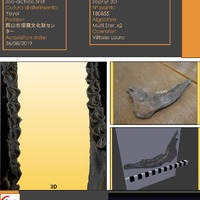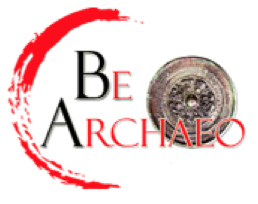AF MNM 051
アイテム
-
タイトル (Dublin Core)
-
AF MNM 051
-
内容記述/Description (Dublin Core)
-
en
Deer jaw bone from the Minamikata site
This deer jawbone, originating from the Minamikata site, is one of the many pieces of evidence supporting the integral role these animals played in the diet of the Yayoi-era inhabitants. The bone manipulations suggest activities ranging from butchering to various other purposes. In general, teeth and cranial fragments could be transformed into luxury items used for adorning dwellings.
-
ja
南方遺跡出土の鹿の顎骨
この南方遺跡出土のシカの顎骨は、これらの動物が弥生時代の住民の食生活において重要な役割を果たしていたことを裏付ける多くの証拠の 1 つである。骨の操作は、屠殺から他のさまざまな目的に至る活動を示唆しています。一般に、歯や頭蓋骨の破片は、住居を飾るために使用される高級品に変えることができます。
-
AF number - AF番号 (Archaeological Finding Record Vocabulary - ja)
-
51
-
SOURCE OF THE FINDING (some SU record) - 出土層 (Archaeological Finding Record Vocabulary - ja)
-
Minamikata / 南方
-
Object definition (Be-Archaeo thesaurus) - BE-ARCHAEOシソーラスでの分類 (Archaeological Finding Record Vocabulary - ja)
-
Animal Bones
-
Object definition (Getty-AAT thesaurus) - Gettyシソーラスでの分類 (Archaeological Finding Record Vocabulary - ja)
-
bone (material)
-
DIRECTLY RELATED OBJECT (currently located in) - 直接関連オブジェクト(現在、所蔵されている場所) (Archaeological Finding Record Vocabulary - ja)
-
Okayama Archaeological Museum
-
DIRECTLY RELATED OBJECT (initially found in) - 直接関連オブジェクト(発見された場所) (Archaeological Finding Record Vocabulary - ja)
-
Minamikata / 南方
-
CHRONOLOGY - 年代 (Archaeological Finding Record Vocabulary - ja)
-
en
Yayoi period
-
ja
弥生時代
-
CHRONOLOGY MOTIVATION - 年代根拠 (Archaeological Finding Record Vocabulary - ja)
-
en
Dating of the feature from which the object was unearthed
-
ja
出土遺構の年代
-
ARCHAEOMETRIC INVESTIGATION (some archaeometric data record) - 理化学的分析あり(リンクを含める) (Archaeometric Investigation Record Vocabulary)
-
 AF MNM 051 PG acquisition
AF MNM 051 PG acquisition
 AF MNM 051 PG acquisition
AF MNM 051 PG acquisition
 original photo
original photo AF MNM 051 PG acquisition
AF MNM 051 PG acquisition
